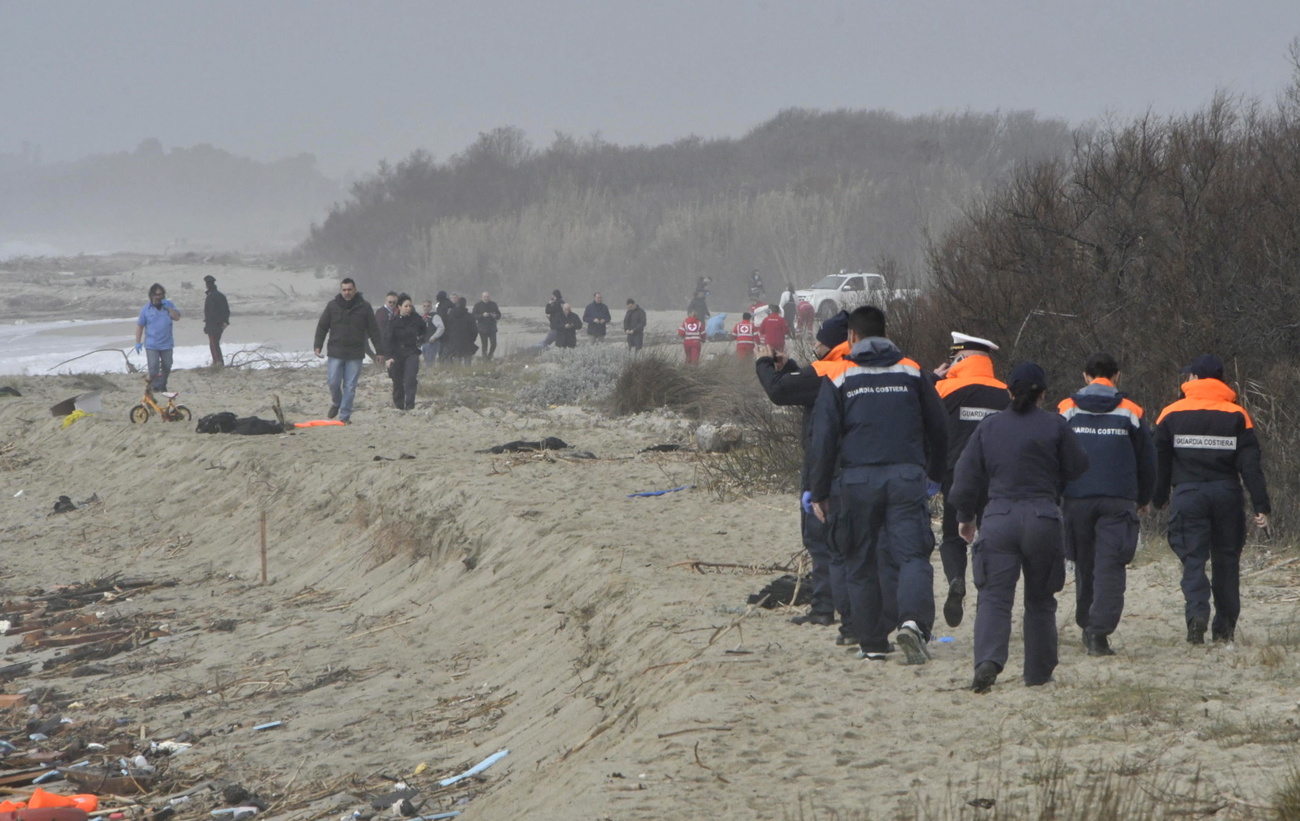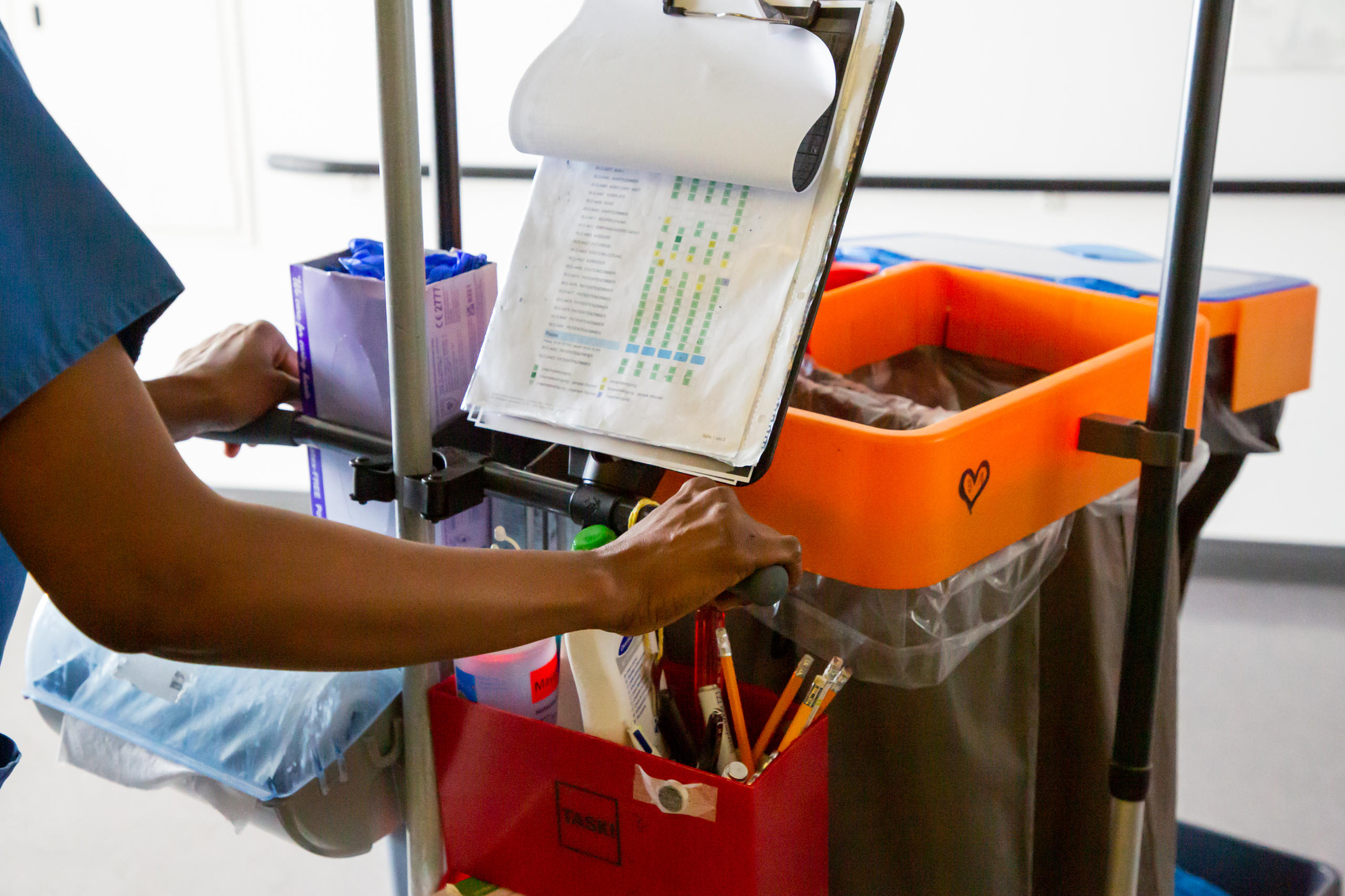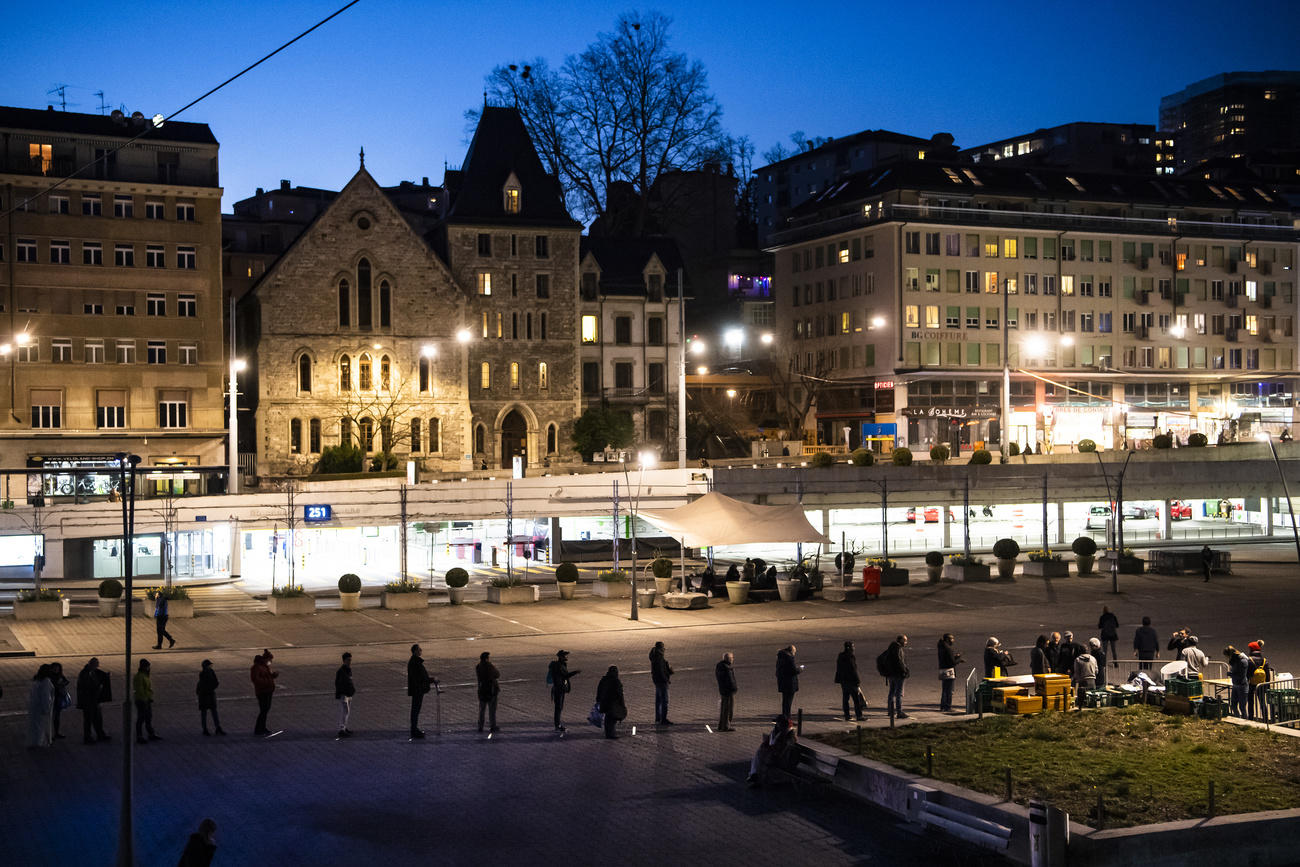Refugees often shunned by Swiss employers

Many refugees can’t find work in Switzerland. Yet they are a valuable resource that employers can tap into to overcome the current labour shortage. Not knowing their rights and preconceived ideas about them are part of the problem.
In her native Benin, Judith Houetohossou has worn many hats. She was a hairdresser and a secretary for a local newspaper; she trained in IT; she even opened a restaurant with her sister. Since 2019, she has been a refugee in Switzerland and has worked as a cleaner at Biel/Bienne Hospital, in canton Bern, for almost a year.
“I mainly clean the rooms of patients who have been discharged,” the 45-year-old explains. Several times a week she also helps serve meals. The work is fast paced, with limited time for each task, and the days are often long, but she goes about her job with a cheerful smile.
Working can mean a lot to people with refugee status. It leads to financial independence, but it is also a way of integrating into Swiss society and understanding how it works. “My husband died last year,” Houetohossou explains. “I didn’t know anyone here. At work I met people, and we sometimes also get together at weekends.”
The head of housekeeping at the hospital, Melissa Silva Melo, is delighted with her team member’s motivation and enthusiasm. “She learnt everything in just two days. She fitted in very quickly and is both reliable and flexible.” These qualities are vital, especially when staff is short. “I sometimes have to call in a team member who is on leave to lend a hand. Judith has often bailed us out,” she says.
Valuable resource pool
Switzerland is facing an unprecedented labour shortage, which is expected to get worse in the coming years. At the end of last year more than 120,000 jobs were vacant, according to figuresExternal link from the Federal Statistical Office. Difficulties in recruitment affect all fields, but the health sector is particularly badly hit, with 17,600 unfilled positions in late December.
Against this backdrop, refugees represent a valuable pool of resources – especially as the number of migrants arriving in Switzerland is increasing sharply. A total of 24,511 applications for asylum were lodged in Switzerland last year, up by 64% from the previous year. The federal and cantonal governments estimate that around 70% of these people could join the labour force on a long-term basis. For the moment, though, this potential has not been fully exploited, and fewer than half of all refugees are gainfully employed.
>> This graphic shows the evolution of asylum processing in Switzerland
Their employment rate varies according to the category of residence permit they have been granted, as shown by statisticsExternal link from the State Secretariat for Migration (SEM). Thus 41.4% of those who have been granted asylum, and therefore hold a refugee B permitExternal link, are gainfully employed. Meanwhile, 47.3% of those admitted on a temporary basisExternal link (F permit holders) – who are not entitled to asylum but for whom Switzerland recognises a need for protection – are employed.
Refugees who have fled the war in Ukraine come in a category of their own, and have received S protection status since the start of the conflict. Just over 10% of them have been able to join the workforce, according to latest dataExternal link published by the SEM.
+ Switzerland triggers unprecedented special status for Ukrainian refugees
Varied access to the labour market
These three categories enjoy unrestricted access to the job market. In 2019 the government even removed certain administrative hurdles. Thus, employers no longer need to request authorisation to hire people with a B or F permit. They must simply inform the authorities of the employment via the online portal EasyGov.swiss.
“For Ukrainians with an S permit, employers still have to request permission from the cantonal authorities, so that they can ensure compliance with working conditions,” explains Sophie Malka, coordinator of Vivre Ensemble, a French-speaking Swiss association that promotes the integration of refugees.

More
Ukrainian jobseekers in Switzerland face uphill struggle
Meanwhile, people whose asylum applications are being processed (N permit holderExternal links) have only limited access to the labour market, as they are not permitted to work during the first three to six months after submitting their request, and their employment may be limited to certain sectors. Only 3.1% of them are gainfully employed. And anyone who has been refused asylumExternal link (that is, they have been issued with a removal order or their application has been deemed inadmissible) loses the right to work.
Employers shy from ‘temporarily admitted’ refugees
Theoretically, it is simple to employ someone who has an F or B refugee permit. In practice, though, finding a job can be a real obstacle course. Fikadu*, a 38-year-old Eritrean living in Geneva, has experienced this first-hand.
After arriving in Switzerland in late 2014, he was admitted on a temporary basis and received an F permit, like most of his compatriots. “Because of this temporary status, nobody wanted to hire me. I was offered unpaid internships of three or four months,” he says. Without a job, he depended on social assistance and had to live in a hostel for migrants. “Where I come from, if you don’t work, you can’t live. Whereas here you can live, but it’s depressing.”
After years of searching, Fikadu finally landed a steady job as a delivery man. Some months later, however, he was made redundant as part of a collective dismissal. This first fixed-term contract nonetheless enabled him to transform his provisional admission into a refugee B permit. “After that, I was able to find work more easily, in a cleaning company. This also meant I could move into a small flat.”
Social educator Sewit Abadi helps promote the professional integration of refugees through the Association of Intercultural Women Mediators in Geneva. She has supported Fikadu and other refugees in their search for work.
“Temporarily admitted refugees have a higher employment rate than those who have been granted asylum, but they often get more precarious work contracts. Employers are wary of taking on someone with an F permit, thinking that they will go back to their home countries,” she explains. This is not the case, however, as 84% of F permit holders go on to receive a long-term permit and stay in Switzerland for good.

More
Swiss asylum requests expected to remain high in 2023
Reviewing the basic requirements
Even without the “temporary” label, refugee B permit holders can have difficulty finding work. This is the case of Berihu*, a 24-year-old refugee from Eritrea.
The young man arrived in Switzerland when he was still a minor and finished his schooling in Geneva. He went on to obtain a federal vocational training certificate in sales, a form of apprenticeship aimed at young people with mainly practical skills. “I’ve been looking for work for three years now, and I’ve got nowhere. Yet I learnt French quickly and did training. They say we have to work, but it’s impossible,” he sighs.
Abadi, the social educator, also has difficulty in pinpointing where the problem lies. “You have the impression that young people like Berihu are doing everything they should, but they are unable to get a fixed employment contract. It’s very hard for them.” She believes that certain basic requirements should be adapted to make it easier for them to find work. “For instance, speaking perfect French should not be necessary to work as a cleaner. Languages can also be picked up on the job,” she says.
Combating preconceived ideas
Malka, of Vivre Ensemble, considers the Swiss government’s plan to integrate 70% of refugees into the labour market to be realistic. In her view, the problem stems from ignorance of the rights linked to the different statuses within the Swiss asylum system. “We must continue to raise awareness among employers, above all reminding them that these people are going to stay in Switzerland, where they have been granted protection,” she says.
Certain preconceived ideas also need to be overcome, Malka cautions. “It’s easy to forget that these people come to us with their own skillsets. Everything seems to melt away behind the label of migrant.”
Measures must be taken, she believes, to tap into this potential immediately and help new arrivals enter the world of work. “The longer we wait before doing so, the harder it gets for them to find work, as they lose their skills, their self-confidence or their acquired knowledge,” she says.
She also regrets that people whose asylum requests are pending (N permit holders) are forbidden from working in the first few months and do not benefit from any real integration measures.
Challenge for the Swiss economy
Swiss business circles also advocate integrating refugees into the workforce. “Given the historic labour shortage, we cannot afford to overlook this resource,” says Marco Taddei, head of the Swiss Employers’ Association in French-speaking Switzerland. He nonetheless identifies several obstacles that must be overcome: the language barrier, cultural differences and the need to match the refugees’ skills with the expectations of Swiss employers.
Taddei believes it will be difficult to increase the employment rate of this category of people. “I think we can already be satisfied with the results achieved. Companies are doing what they can. And it’s well worth their while, as they are generally getting hard workers who are strongly motivated,” he concludes.
*name known to the editorial staff
Edited by Samuel Jaberg. Translated from French by Julia Bassam.

More
‘Switzerland is violating the Dublin accords by letting migrants pass through’

In compliance with the JTI standards
More: SWI swissinfo.ch certified by the Journalism Trust Initiative










You can find an overview of ongoing debates with our journalists here . Please join us!
If you want to start a conversation about a topic raised in this article or want to report factual errors, email us at english@swissinfo.ch.